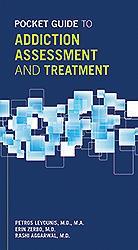Description
Pocket Guide to Addiction Assessment and Treatment
Authors: AGGARWAL Rashi, LEVOUNIS Petros, ZERBO Erin
Language: English
Subjects for Pocket Guide to Addiction Assessment and Treatment:
Approximative price 60.42 €
In Print (Delivery period: 15 days).
Add to cart
Publication date: 08-2016
379 p. · Paperback
379 p. · Paperback
Description
/li>Contents
/li>Biography
/li>
Ambivalence, poor adherence to treatment, serious psychiatric and
medical comorbidities—the difficulties posed by patients of substance
use disorders are among the most challenging for practitioners to face.
Given that only 10% of patients with these disorders actually receive
specialized addiction treatment, it’s clear that physicians in all
medical and surgical specialties need to become comfortable assessing
and treating substance use disorders.
The Pocket Guide to Addiction Assessment and Treatment is designed specifically to aid a wide range of clinicians, regardless of their training in addiction, to more confidently assess and treat this patient population.
The book’s practical, actionable content is divided into three sections—Fundamentals of Addiction, Substances and Behaviors, and Treatment—that address topics including:
. The neurobiology of addiction
. How to recognize and treat intoxication, withdrawal from, and addiction to substances such as alcohol, anabolic-androgenic steroids, benzodiazepines, cannabis, opioids, stimulants, and tobacco, as well as hallucinogens, inhalants, and caffeine
. Special issues with psychiatric and medical comorbidities, as well as with specific populations
. Behavioral addictions, with a special focus on gambling disorder
. Cognitive-behavioral therapy, 12-step programs, nutrition and exercise, spirituality, mindfulness, and meditation, and other treatment options, with examples of how each can be used with patients facing addictions
With an accessible, easily referenced format, the Pocket Guide to Addiction Assessment and Treatment serves as a go-to resource for general psychiatrists, internists, family practitioners, pediatricians, emergency medicine physicians, psychiatric nurses, residents, medical students, and other practitioners involved in the addiction treatment field. And because all of the diagnostic discussions are DSM-5®–based, readers can be confident that they’re getting the most relevant and up-to-date guidance on the topic.
The Pocket Guide to Addiction Assessment and Treatment is designed specifically to aid a wide range of clinicians, regardless of their training in addiction, to more confidently assess and treat this patient population.
The book’s practical, actionable content is divided into three sections—Fundamentals of Addiction, Substances and Behaviors, and Treatment—that address topics including:
. The neurobiology of addiction
. How to recognize and treat intoxication, withdrawal from, and addiction to substances such as alcohol, anabolic-androgenic steroids, benzodiazepines, cannabis, opioids, stimulants, and tobacco, as well as hallucinogens, inhalants, and caffeine
. Special issues with psychiatric and medical comorbidities, as well as with specific populations
. Behavioral addictions, with a special focus on gambling disorder
. Cognitive-behavioral therapy, 12-step programs, nutrition and exercise, spirituality, mindfulness, and meditation, and other treatment options, with examples of how each can be used with patients facing addictions
With an accessible, easily referenced format, the Pocket Guide to Addiction Assessment and Treatment serves as a go-to resource for general psychiatrists, internists, family practitioners, pediatricians, emergency medicine physicians, psychiatric nurses, residents, medical students, and other practitioners involved in the addiction treatment field. And because all of the diagnostic discussions are DSM-5®–based, readers can be confident that they’re getting the most relevant and up-to-date guidance on the topic.
Preface
Part I: Fundamentals of Addiction
Neurobiology of Addiction: From Reward to Relief: The Complex Neuroadaptations Underlying Addiction
Addiction Assessment Across Settings of Care: Approaches for the Twenty-First Century
DSM-5 Diagnosis and Toxicology
Part II: Substances and Behaviors.
Alcohol
Anabolic-Androgenic Steroids
Benzodiazepines
Caffeine
Cannabis
Hallucinogens and Dissociative Drugs
Inhalants
Opioids
Stimulants
Tobacco
Behavioral Addictions: Focus on Gambling Disorder
Part III: Treatment
Cognitive-Behavioral Therapy
Relapse Prevention
Motivational Interviewing
Twelve-Step Programs and Spirituality
Mindfulness and Mentalization
Nutrition and Exercise
Index
Part I: Fundamentals of Addiction
Neurobiology of Addiction: From Reward to Relief: The Complex Neuroadaptations Underlying Addiction
Addiction Assessment Across Settings of Care: Approaches for the Twenty-First Century
DSM-5 Diagnosis and Toxicology
Part II: Substances and Behaviors.
Alcohol
Anabolic-Androgenic Steroids
Benzodiazepines
Caffeine
Cannabis
Hallucinogens and Dissociative Drugs
Inhalants
Opioids
Stimulants
Tobacco
Behavioral Addictions: Focus on Gambling Disorder
Part III: Treatment
Cognitive-Behavioral Therapy
Relapse Prevention
Motivational Interviewing
Twelve-Step Programs and Spirituality
Mindfulness and Mentalization
Nutrition and Exercise
Index
Petros Levounis, M.D., M.A., is Chair of the Department of Psychiatry at Rutgers New Jersey Medical School, and Chief of Service at University Hospital in Newark, New Jersey.
Erin Zerbo, M.D., is Assistant Professor of Psychiatry at Rutgers New Jersey Medical School in Newark, New Jersey.
Rashi Aggarwal, M.D., is Associate Professor of Psychiatry at Rutgers New Jersey Medical School in Newark, New Jersey.
Erin Zerbo, M.D., is Assistant Professor of Psychiatry at Rutgers New Jersey Medical School in Newark, New Jersey.
Rashi Aggarwal, M.D., is Associate Professor of Psychiatry at Rutgers New Jersey Medical School in Newark, New Jersey.
© 2024 LAVOISIER S.A.S.




